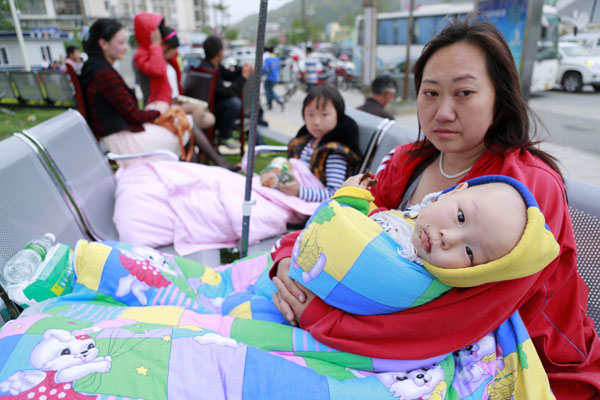Regional economy at risk
|
Zhu Ying, 33, takes her two children outdoors at the Lushan county of Ya'an, Sichuan province on Saturday. Feng Yongbin / China Daily |
China's GDP won't suffer as area is not industrial base, analysts say
Saturday's earthquake in Sichuan province will damage regional industries but have a limited impact on the national economy, experts said.
"The earthquake's impact is so far not very clear. But I believe it will somewhat damage the regional economy in the short term, and that damage will probably rise as calculations and investigations of the losses from the disaster continue," said Ding Ningning, a researcher at the State Council's Development Research Center.
"But the earthquake will not greatly hurt China's overall economy because Ya'an, a third-tier city, is neither a raw material production base nor manufacturing zone."
The earthquake came on the same fault line as the magnitude-8 quake that struck Wenchuan in Sichuan on May 12, 2008, with more than 87,000 people dead or missing, according to government figures. Direct economic losses then in Sichuan and neighboring Gansu and Shaanxi provinces totaled 845.1 billion yuan ($134 billion), and the regional infrastructure was severely damaged.
"The impact of this earthquake is difficult to assess right now, but preliminary information indicates the losses will be much smaller than those from the Wenchuan earthquake," said Zhang Yuanhong, a researcher at the rural development institute under the Chinese Academy of Social Sciences.
Sichuan is a major agricultural and hog farming region.
But Zhang emphasized that damage to its agricultural output will be limited because the mountainous area is not a leading grain production base.
And fear of a pork shortage would be misplaced because consumption of the meat and poultry is weak amid a low pork price, he said.
She Minhua, a senior analyst at Zhongde Securities Co, said the impact of Saturday's earthquake on the main board index will be "marginal".
However, he said, certain sectors and local enterprises in Sichuan will be affected. An increase in insurance claims will add pressure on insurers' share prices, for example.
On the other hand, the demand for building materials during reconstruction will be good news for local cement and steel producers.
Zhang said that the earthquake's damage will be more directly reflected in the industrial sector and infrastructure.
Chengdu Shuangliu International Airport closed after the quake but quickly reopened, and train service from Chengdu was suspended before 3 pm, Xinhua said.
Toyota Motor Corp halted production at its plant in the region and told employees to go home to ensure the safety of their families, according to company spokesman Ryo Sakai, who is attending an auto show in Shanghai. The quake should have little effect of the company's operations, Sakai said.
Volkswagen AG's joint-venture car plant in the province has not been affected, Bloomberg reported citing the Wolfsburg, Germany-based company's China spokesman Christoph Ludewig.
"No worker was killed and our facilities, including the plant and office, were in good condition," said a news release from Liu Pingkai, board secretary of Sichuan Yahua Industrial Group Co Ltd, an explosives maker that went public on the Shenzhen Stock Exchange in 2010. Liu added that no production was scheduled on Saturday and preliminary examinations had discounted any large potential safety hazard.
Pan Jiancheng, deputy director-general with China Economic Monitoring & Analysis Center at the National Bureau of Statistics, said he thinks economic growth in the world's second-largest economy will be "smooth" this year.
"Gross domestic product growth will be around 7.5 to 8 percent this year," he said.
"Even the Wenchuan earthquake in 2008 did not cause major challenges to the economy," Pan said.
GDP growth in the second quarter of 2008 was still above 11 percent before it dropped to single digits in the fourth quarter, Pan said, and that was mainly a result of the global financial crisis.

























